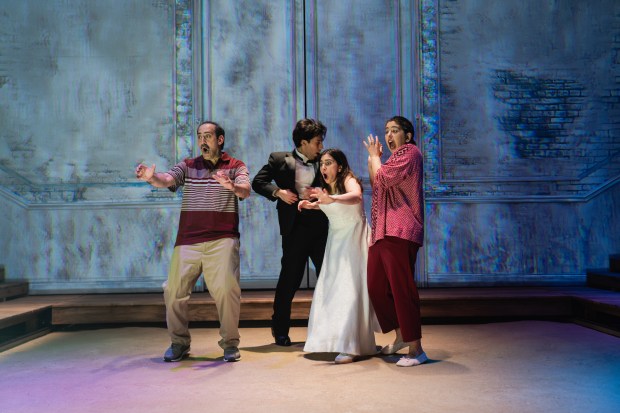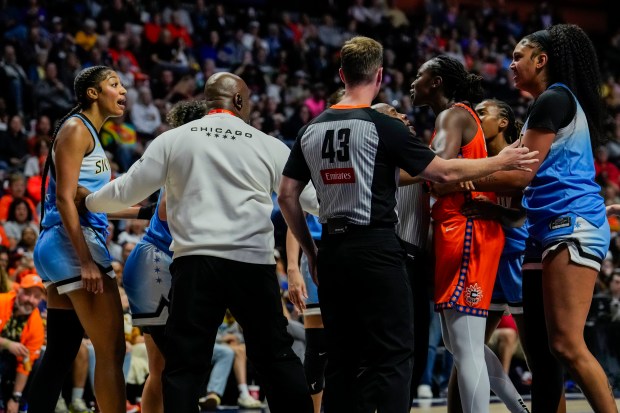An effort to drop Chicago’s citywide speed limit from 30 mph to 25 mph advanced in the City Council Monday.
The legislation aimed at reducing traffic crashes and fatalities passed in an 8-to-5 vote in the Pedestrian and Traffic Safety committee.
But Chicago drivers won’t soon face lower speed limits — or corresponding lower thresholds on most roads for the city’s extensive network of automated speed cameras to issue tickets. Sponsor Ald. Daniel La Spata, 1st, will not bring the ordinance forward for a final full City Council vote Tuesday, saying he wants to give his colleagues more time to weigh the proposal. Opponents were likely to stall the measure if it did come up for a full council vote.
Crashes killed 136 Chicagoans last year and left about as many people hit and injured as were struck by gunfire, said La Spata, the committee’s chair, in arguing Monday for the change.
The speed limit drop “sets us on the pathway to save the lives of hundreds of people, hundreds of Chicagoans in the next decade,” La Spata said.
However, some aldermen pushed back against the move, citing equity concerns. If the city’s default speed limit drops, they argued, Black people and less wealthy people will be hit by even more speeding tickets. Many of the speed cameras that annually issue the most tickets are located in South and West Side wards where residents are hardest-pressed to pay the fines.
Those same concerns appear to be at the core of Mayor Brandon Johnson’s tentative response to the proposal. Johnson said Friday he “fully supports” lowering the speed limit, but added in the same breath that “it is a matter of how we implement it so it is done in an equitable way.”
Ald. Jason Ervin, 28th, unsuccessfully pushed for the committee vote to be delayed Monday. He and each of the three other Black South and West Side aldermen present Tuesday voted against the ordinance.
“Communities have different challenges, and I think this one size fits all approach is not necessarily in the best interest of all Chicagoans,” Ervin said. “When you’re dealing with homelessness, violence, not enough economic opportunity, a plethora of issues, I’m sorry, but reducing the speed limit is not the number one issue that my community is looking at.”
More people are killed or seriously injured by traffic crashes in Ervin’s ward last year than any other, La Spata responded.
Twelve people were killed and another 141 seriously injured in traffic crashes throughout Ervin’s West Side ward, according to a study published this fall by the Chicago Department of Transportation. The same study determined Black Chicagoans are 3.8 times more likely than other city residents to be killed in crashes.
The speed limit change would cost $3 million to implement if the Illinois General Assembly does not lower the speed limit for the major Chicago roads controlled by the Illinois Department of Transportation, La Spata said. However, the Northwest Side aldermen predicted state legislators would likely follow the City Council’s lead and change speed limits on IDOT roads if his ordinance passes, making the cost of enacting the change “negligible.”
Ald. Daniel La Spata during a Chicago City Council meeting at City Hall on June 12, 2024. (Antonio Perez/Chicago Tribune)The ordinance would go into effect in 2026, a timeline La Spata said would give city officials time to make sure the potential new speed limit is enforced equitably.
La Spata listed a number of peer cities that have cut their speed limits: Seattle, San Francisco, Minneapolis, Portland and Atlanta. In Boston and New York City, such changes have not led to more tickets, he said. New York’s 2014 shift to a 25 mph speed limit reduced crashes by 39% on affected streets and pedestrian deaths citywide by 23%.
But critics were quick to point out the huge revenue bump the city enjoyed after Mayor Lori Lightfoot ordered speed cameras reset to issue tickets to cars driving as little as six mph over the posted limit as part of her 2021 budget. The group Citizens to Abolish Red Light Cameras released a statement Monday calling on the city to “stop using traffic schemes to fine and fee poor
and working people to balance the city’s budget.”
After Ald. David Moore, 17th, suggested the ordinance was a money grab, La Spata fired back by arguing that he hoped the lower speed limit would result in less fines going toward the city.
“I want to be so clear: The goal is not more revenue,” he said. “The goal is to change behaviors and save lives.”
But without clarity on how the ordinance will affect how many tickets their constituents get, some aldermen said they were not ready to support it. Ald. Desmon Yancy, 5th, told the Tribune he generally backs the idea of slowing the speed limit. However, details around how the ordinance will avoid a disparity in enforcement need to be flushed out before he will vote for it, he added.
“I think things are moving very quickly,” he said. “We’ve got to slow down.”
The committee also advanced an ordinance that would allow Chicagoans to submit photos of commercial trucks and cars illegally parked in bike and bus lanes to lead to tickets. If the ordinance becomes law, car drivers would get two warnings before needing to go before a judge to fight a ticket for alleged violations, while the drivers of commercial trucks could immediately face hearings and tickets.
A similar effort to ramp up enforcement of parking rules, the Safe Streets pilot program, has been stalled for months. The program will use cameras on buses to automatically ticket downtown drivers parked illegally in bus lanes, bike lanes and loading zones.
After blowing past a projected summertime start, the pilot program is finally moving forward this week with the testing of cameras fixed to city vehicles, CDOT spokesperson Erica Schroeder said Monday. No warnings or citations will be issued during the testing, Schroeder added.
The committee also advanced a resolution calling for the creation of a working group aimed at making car ticketing more equitable.




